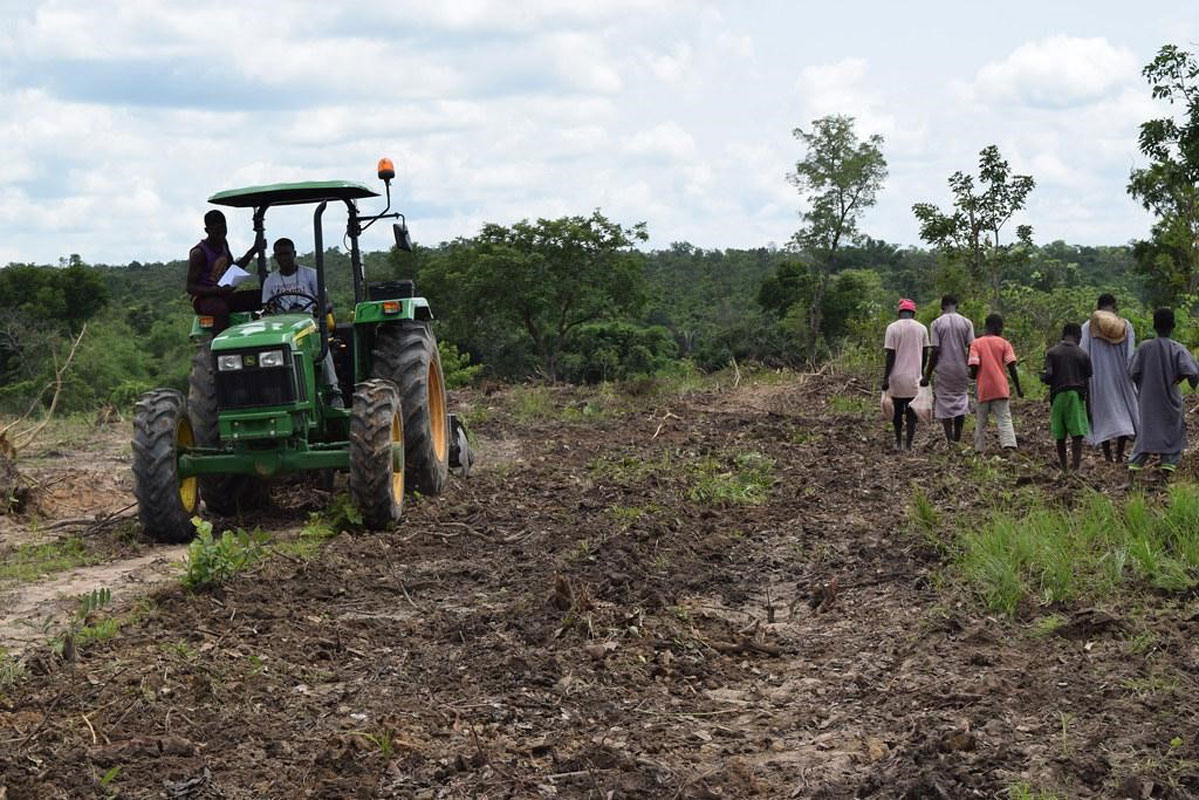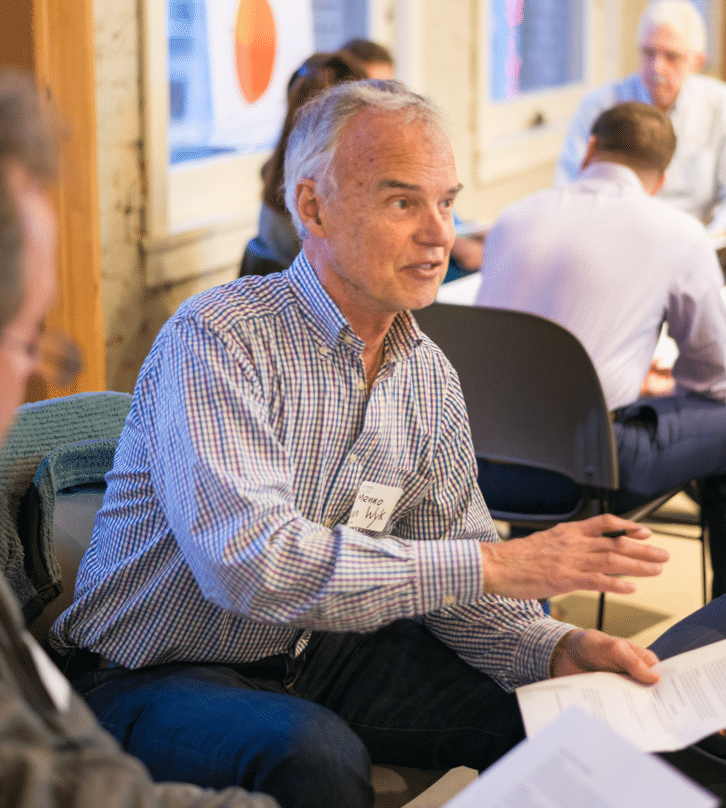Smallholder farmers in sub-Saharan Africa do most fieldwork using hand tools and manual labor, usually on their own but occasionally with hired hands. Some farmers use draft animals. Only a rare few have tractors or other machinery to take on the heaviest burden. Food security advocates say mechanization would improve smallholder farm productivity and profitability as it did in the developed world. Mechanization can be controversial (see our previous article https://www.growfurther.org/rise-of-the-machines-the-debate-over-conservation-tillage-in-ghana/), but much of that debate is moot since most smallholder farmers can’t afford tractors in the first place—or can they?
Beginning a few short years ago, innovative companies have emerged to sell a “tractor-as-service” concept to Africa’s smallholder farms. Their business models vary, but they generally involve mobile technologies delivered via smartphone-based applications farmers can use to order tractors only when they need them on their fields, somewhat akin to popular “ride-share” apps. That’s why the Alliance for a Green Revolution in Africa (AGRA) dubbed the concept tractor-as-service idea “Uber for tractors” in a report. AGRA zeroed in on three innovative companies dabbling in short-term tractor rentals for Africa’s smallholder farms: TROTRO Tractor Limited, Hello Tractor, and ETC Agro. The UN Food and Agriculture Organization (FAO) also scrutinized Tinga Rentals Store in an earlier assessment (https://www.fao.org/3/cb2151en/cb2151en.pdf).
Do farmers making use of these app-based tractor leasing schemes enjoy higher yields than farmers still relying on manual labor or draft animals? These businesses have only existed for five years, but there are already a few case studies, which highlight both the potential and limitations of these “Uber for tractors” schemes. Below, we take a closer look at two startup tractor-as-service companies to see where they’ve succeeded and stumbled, and how this information might be helpful for future innovators designing their own breakthroughs in smallholder agriculture.
TROTRO Tractor Limited
The original African tractor-as-service business, TROTRO Tractor Limited was founded in Ghana in 2016 and launched operations in 2017. TROTRO Tractor allows farmers to use a text messaging or dial-up system to schedule tractors and tractor operators for work on their fields only when they need them. Farmers can even pay in advance using a mobile payment system. As FAO describes it, TROTRO Tractor Ltd. is essentially a “platform [that] allows farmers to request, plan, and pre-pay for tractor services, giving them access as and when needed.” In the beginning, the tractors were owned by wealthier farmers interested in lending them out to less-fortunate smallholder farms, so for added peace of mind, TROTRO equipped tractors with GPS tracking devices. TROTRO later began partnering with farm equipment sellers to expand the number of machines on offer and has even partnered with banks to help interested farmers purchase their own tractors for the program. TROTRO Tractor Ltd. is still based in Ghana but has since expanded to Nigeria, Togo, and Zimbabwe. By 2021 the company had more than 27,000 farmers registered to use its service, according to AGRA.
However, it’s far from a perfect system.
“[The platform] allows farmers to request, plan, and pre-pay for tractor services, giving them access as and when needed.”
TROTRO Tractor Ltd. is touted as a great success story, but there are issues. As FAO noted, the company had to essentially roll out an active public relations effort at launch to win public buy-in. TROTRO even had to rely on Ghana’s Ministry of Food and Agriculture in its early days to help win over skeptical farmers. The technology side of the company is coupled with field agents who are dispatched to farms requesting equipment “to confirm the area size and suitability for plowing,” FAO said. So, this is no simple Uber order to get across town—getting a TROTRO tractor sent to a field is a seven-step process. First, a smallholder farmer makes an order through text or dial-up, inputs details on the location and service needed, and then makes a payment. Next, TROTRO processes the order, matches the farm with an available tractor via GPS, and dispatches a field agent. Eventually, a tractor is dispatched but only if there is other work for that tractor and operator to perform in that very same vicinity. In other words, TROTRO first checks to see if the demand for a tractor in any particular area is large enough to justify dispatching one in the first place. If not, the order is canceled. The farmer’s money is refunded in full but that farmer is then out of a tractor, and out of luck.
Hello Tractor
The business consultancy Kinvey described Kenya-based Hello Tractor as “an award-winning diversified ag-tech company focused on improving food and income security throughout sub-Saharan Africa.” Kinvey helped Hello Tractor with building and launching its mobile phone app, while AGRA lent the company institutional support.
Hello Tractor’s business model is very similar to that of TROTRO Tractor Limited, except Hello Tractor partners mainly with equipment sellers whereas TROTRO works more with farmers directly. Hello Tractor’s business is centered on a GPS tracking device that it sells to equipment owners and the software that operates the device, allowing tractor owners to track their equipment in real-time on their phones. In a nutshell, Hello Tractor sells technology offering tractor dealers a way to diversify income streams by making idle machines available to smallholder farms. “The agritech sells their device to tractor owners engaged in organized, commercial value chains,” as AGRA explained in its report (https://agra.org/wp-content/uploads/2021/08/Mechanization_Long.pdf). “The tractor owners, in turn, provide tractor services to smallholders in their value chain networks.” By late 2020, it was estimated that Hello Tractor was serving around 41,000 farmers throughout Kenya. Kinvey estimates that the company controls about 75% of Nigeria’s tractor-as-service market. Hello Tracker says it has since expanded operations to Tanzania, Mozambique, South Africa, Pakistan, and Bangladesh, occasionally partnering with USAID and the consulting giant EY.
As with TROTRO, Hello Tractor\’s process flow is quite a bit more complicated than the “Uber for tractors” analogy lets on. Farmers send orders via an app, and then Hello Tractor relies on booking agents to reach out to a farm community, not just one individual farmer seeking to rent equipment. That booking agent is charged with determining if enough orders can be placed in a certain area to justify dispatching a tractor. It’s the same limitation seen with TROTRO: a tractor is only sent to a region if there is sufficient demand for one, meaning multiple farmers in the same area must be seeking to do essentially the same task with the same piece of equipment. A commitment fee is then charged to the smallholder farmer, and then Hello Tracker puts the request out to the tractor owner who then decides whether to approve it or not. If the equipment owner approves, then a tractor and an operator are dispatched to perform the fieldwork. Full payment is due upon fulfillment of services.
Hello Tractor ran into some trouble early on getting buy-in from both smallholder farmers and equipment owners (AGRA says it helped with the latter). And though its business model is slightly different from TROTRO’s, Hello Tractor has the same glaring issue: smallholder farmers trying to schedule tractor services have no guarantee that they’ll actually receive any, especially if there are too few people in that same region seeking to do the same thing.
TROTRO Tractor Limited and Hello Tractor have enjoyed enormous success, but they both needed government or nonprofit support to find their footing. They have since grown their businesses by leaps and bounds, but their business processes are somewhat cumbersome and neither company can offer anything close to 100% assurance that a farmer using their apps can acquire a service tractor when they need one. Despite being very young, both companies are fast becoming household names in sub-Saharan African agriculture. But the tractor-as-service concept still has some wrinkles left to iron out.
Tractors are something of an enabling technology in agriculture, allowing farmers to more easily adopt many other innovations. Tractors themselves may not need our support, but farmers with access to them may more quickly adopt a wide variety of innovations we support.
— Grow Further
Photography credit: A tractor leased through Hello Tractor works a field. IBM Research, Creative Commons.




